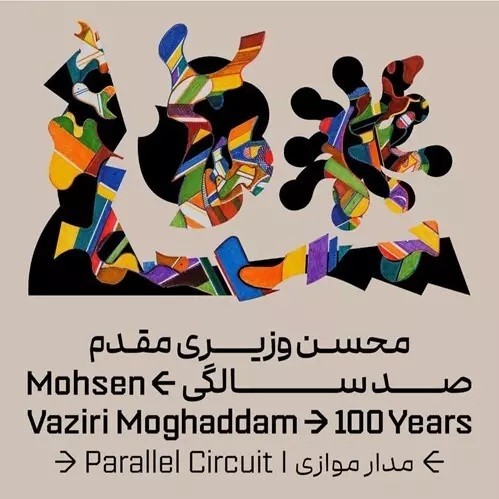Tehran,
No409 of college (hafez) bamshad intersetion
19 July 2024 - 9 August 2024
The Etudes of Fear and Flight
The “Fear and Flight” felt-tip drawings are showcased in Iran for the first time offering a valuable opportunity to witness the evolution of Mohsen Vaziri Moghaddam's thought process and visual transformation during the making of one his most innovative collections.
The tension and unease prevailing in the atmosphere of these sketches continue the disturbance of the “Solzhenitsyn” period, which, by incorporating color and focusing on composition, flows into a realm of confrontation and suspension of rough and jagged forms. In the words of Pierre Restany: “The feeling of threat and widespread violence in the world is realized through intensity and jarring shapes and colors.” The bird that escapes from rough and fork-like forms, first appearing in the studies of the Solzhenitsyn period, is a recurring motif.
As the artist states: “Perhaps this pigeon flying here is my own soul escaping from all the injustices and discomforts that surround me. Of course, this is an example, but it still shows the anger and struggle of innocent
people who don't know what to do.”
people who don't know what to do.”
The Fear and Flight Canvases
This series encompasses various aspects of Vaziri Moghaddam’s artistic achievements. In this series curved and jagged three-dimensional forms migrate from sculptures to paintings and create possibilities for movement, change, and manipulation in space. This series fluctuates between painting, relief, and sculpture. With its hybridity and adaptability it challenges the boundaries and common definitions of media, calling for a reevaluation of established art concepts and a wider understanding of artistic expression.
The book ‘The Gulag Archipelago’ by Alexander Solzhenitsyn, the Russian dissident writer, which narrates in detail the horrifying system of ‘Gulag’ or Soviet labor camps in harsh climate during Stalin’s rule, deeply influenced and moved Vaziri.
The ‘Solzhenitsyn’ sketches, created between 1974 and 1976 reveal a markedly different process from his typical abstract works. They showcase an expressive and rebellious spirit that is rarely seen in his oeuvre. During this time, in 1974, Vaziri Moghaddam was frequently traveling between the cities of Paris, London and Rome. He had recently separated from his second wife, Susanne. Personal life crisis as well as frustration and disappointment with the socio-political climate both in Iran and the world had a profound impact on his mental health and his mental state and this is evident in the numerous scattered sketches that remained from this period. Furthermore, the impact of Alexander Solzhenitsyn book during this period first manifests in his figurative preliminary sketches and the explicit depictions of torture, shooting and contorted bodies. The expressive, disturbed strokes do not represent the artist’s characteristic style but rather indicate his profound disturbance and his state of mind at this transitional period.
